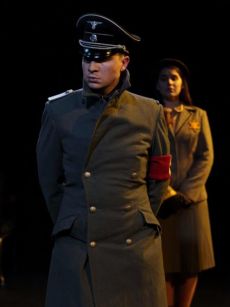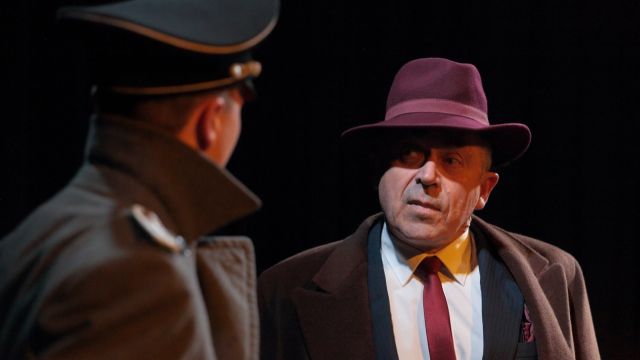Raoul Wallenberg Saved Me and Five Minutes to Midnight
These two plays, companion pieces, concern history that risks being lost - or is indeed unknown to many people. Both feature real people – neurologist Professor Frank Vajda, the late Kitia Altman, survivor of Auschwitz, Swedish diplomat Raoul Wallenberg and ‘Final Solution’ administrator Adolf Eichmann.
In Raoul Wallenberg Saved Me Frank Vajda (played by Tony Clayton) tries to persuade the head of a university publishers, Mary Lou Murphy (Julie Arnold) to publish his autobiographical memoir Raoul Wallenberg Saved Me. The title refers to an historical fact: Wallenberg really did save nine-year-old Frank and his mother from an SS firing squad in Nazi-occupied Budapest – and subsequently saved them and thousands of other Budapest Jews from deportation and murder. The publisher is more than reluctant: yes, yes, but there are so many books about the Holocaust already, people are sick of hearing about it, it’s not a commercial proposition. Vajda insists that his book is important. (The publisher, in reality, has a point. There have been numerous books and films not just about the Holocaust but about Wallenberg specifically, about whom there is an award-winning documentary and even a min-series.)
 In a series of flashbacks, Mr Clayton himself now plays Wallenberg (sans accent), and Sean Paisley Collins an SS sergeant with a ‘German’ accent, in charge of the firing squad. Wallenberg arrives and insists boy Frank and his mother (Grace Cairnduff in this and other roles) are under the protection of Sweden and killing them violates Swedish neutrality. But, in the present, Vajda has another objective besides honouring the heroism of Wallenberg. Adolf Eichmann was in Budapest, and when the publisher refers to Hannah Arendt’s ‘banality of evil’, Vajda disagrees vehemently: according to him, Eichmann was a ‘sadistic bastard who enjoyed killing Jews’. In further flashbacks, Mr Collins portrays Eichmann (clearly distinguishing him from the SS sergeant) in a number of encounters with Wallenberg. It is doubtful that these encounters ever occurred, but this is playwright Neil Cole’s way of putting Eichmann on stage – although, curiously, nothing in Eichmann’s dialogue really contradicts Arendt’s assessment. For some reason, in addition, director Michelle Swan has Mr Collins give us an Eichmann who is slick, sleazy, boastful, rather dull, certainly unfeeling, but emphasising his administrative success and the rewards that brings. The fact that it is Jews who must be killed is simply in the nature of the task.
In a series of flashbacks, Mr Clayton himself now plays Wallenberg (sans accent), and Sean Paisley Collins an SS sergeant with a ‘German’ accent, in charge of the firing squad. Wallenberg arrives and insists boy Frank and his mother (Grace Cairnduff in this and other roles) are under the protection of Sweden and killing them violates Swedish neutrality. But, in the present, Vajda has another objective besides honouring the heroism of Wallenberg. Adolf Eichmann was in Budapest, and when the publisher refers to Hannah Arendt’s ‘banality of evil’, Vajda disagrees vehemently: according to him, Eichmann was a ‘sadistic bastard who enjoyed killing Jews’. In further flashbacks, Mr Collins portrays Eichmann (clearly distinguishing him from the SS sergeant) in a number of encounters with Wallenberg. It is doubtful that these encounters ever occurred, but this is playwright Neil Cole’s way of putting Eichmann on stage – although, curiously, nothing in Eichmann’s dialogue really contradicts Arendt’s assessment. For some reason, in addition, director Michelle Swan has Mr Collins give us an Eichmann who is slick, sleazy, boastful, rather dull, certainly unfeeling, but emphasising his administrative success and the rewards that brings. The fact that it is Jews who must be killed is simply in the nature of the task.
Mr Clayton gives substance to Professor Vajda with moving sincerity, although his Wallenberg is perhaps a little too jolly and confident – which actually undercuts the heroism. Things are not helped by the form Neil Cole choses for the story and the debate. The relatively short scenes in the present alternating with the flashbacks, punctuated by blackouts for costume and minimal set changes, kills any narrative flow and therefore tension, and the play becomes purely didactic.
 The second play Five Minutes to Midnight is both simpler and far more successful as a play. Julie Arnold now plays Kitia Altman – and well too since now she has a character rather than just a position to inhabit. Kitia died in 2017, but she was a guide at the Melbourne Holocaust Museum since 1984. Here she is a somewhat eccentric but patient and sweet-natured old woman in dialogue with teenage Melanie (Grace Cairnduff) at the Museum. Melanie is more interested in volleyball than history – and Ms Cairnduff captures teenage insouciance convincingly, as well as exhibiting some skill with the volleyball she maddeningly carries, tosses, bounces and juggles. During their exchanges, a security guard (Mr Collins transformed) amiably but irrelevantly wanders in and out. Kitia’s aim (like Professor Vajda’s) is to persuade someone in the contemporary world – our world – that the Holocaust must be remembered. Of course, this is exactly what the real Kitia did with thousands of school children and other visitors. It’s interesting, since Neil Coles has written both characters – that Kitia’s case is rather more subtle. It is that we must remember the Holocaust, not just because it happened to Jews (and others), but because it could happen so easily again. (And did and does, we might add.)
The second play Five Minutes to Midnight is both simpler and far more successful as a play. Julie Arnold now plays Kitia Altman – and well too since now she has a character rather than just a position to inhabit. Kitia died in 2017, but she was a guide at the Melbourne Holocaust Museum since 1984. Here she is a somewhat eccentric but patient and sweet-natured old woman in dialogue with teenage Melanie (Grace Cairnduff) at the Museum. Melanie is more interested in volleyball than history – and Ms Cairnduff captures teenage insouciance convincingly, as well as exhibiting some skill with the volleyball she maddeningly carries, tosses, bounces and juggles. During their exchanges, a security guard (Mr Collins transformed) amiably but irrelevantly wanders in and out. Kitia’s aim (like Professor Vajda’s) is to persuade someone in the contemporary world – our world – that the Holocaust must be remembered. Of course, this is exactly what the real Kitia did with thousands of school children and other visitors. It’s interesting, since Neil Coles has written both characters – that Kitia’s case is rather more subtle. It is that we must remember the Holocaust, not just because it happened to Jews (and others), but because it could happen so easily again. (And did and does, we might add.)
These two plays are perhaps more ‘plays for discussion’ than ‘dramatic works’ per se. Here they are presented in the simplest, most stripped back form so that the issues stand out starkly – and Professor Vajda and Kitia Altman are right: the issues are important. It is, it seems, all too easy to dehumanise people and thus absolve their persecutors and killers from all responsibility.
Michael Brindley
Photographer: David Swann
Subscribe to our E-Newsletter, buy our latest print edition or find a Performing Arts book at Book Nook.

